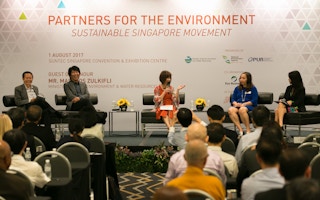What Singapore needs for the sustainability agenda to take root is to convert all the hype, hyperbole and high expectations into real action, said speakers at a forum last week.
To continue reading, subscribe to Eco‑Business.
There's something for everyone. We offer a range of subscription plans.
- Access our stories and receive our Insights Weekly newsletter with the free EB Member plan.
- Unlock unlimited access to our content and archive with EB Circle.
- Publish your content with EB Premium.
The city-state has been successful in raising environmental awareness through the Sustainable Singapore Sustainable Blueprint and Singapore Sustainable Movement, but it was time to change tack, said Minister for the Ministry of the Environment and Water Resources (MEWR), Masagos Zulkifli at the inaugural Partners for the Environment: Sustainable Singapore Movement forum.
Setting the tone in his opening address, he said: “It is timely to move beyond general public awareness to a deeper engagement with organisations and individuals, to explore how to take the movement further, to entrench the value and meaning of sustainability messages into the minds of all of us in Singapore.”
Emphasising the importance of collaboration, the minister said: “Collaborations, particularly across sectors, allow organisations to pool resources and tap on diverse skills and talents to co-create solutions that would be difficult to achieve alone.”
In her welcome remarks, Jessica Cheam, managing editor of Eco-Business, said that the aim of the forum was not to stage yet another “NATO” conference. The acronym, used locally, does not refer to the military alliance between North America and Europe, but rather stands for “no action, talk only” and criticises people who talk big but do little.
The forum should instead be seen as a chance to “plant seeds of change” for a future Singapore that Singaporeans want and are willing to be held accountable for, she said to the 400-strong audience at Suntec Singapore Exhibition and Convention Centre.
Organised by MEWR and Eco-Business, the half-day forum featured presentations, panels and group discussions on how to take collaborative action for the environment.
Partnering for the environment
Businesses need help from governments and NGOs when they try to become more sustainable, said Erin Meezan, chief sustainability officer of carpet maker Interface.
Sharing the experience of Interface’s Net-Works project, where discarded fishing nets were recycled into nylon for carpet tiles, Meezan said: “As we take this lesson and ask [other] businesses to redesign how they do business with the SDGs in mind, we’re going to need NGOs and governments to step forward and help set those conditions for collaboration, help us identify potential partners, help us with purchasing policies, make connections, incentivise businesses to change their behaviours, and take these pilot projects to scale in a much quicker way.”
US President Donald Trump’s decision to remove the United States from the Paris Agreement also pushed the American carpet maker to work more closely with other businesses—the We Are Still In initiative for businesses that remain committed to achieving climate goals—and the government. Interface has hosted congressional delegates at its factories to show them what climate action can mean for businesses.
A culture of collaboration has matured in Singapore, noted Elaine Tan, chief executive officer of the World Wide Fund for Nature (WWF) Singapore. It would have been inconceivable for NGOs to be in the same room as government and business representatives to talk about sustainability just 10 years ago, she said.
The involvement of religion in the sustainability movement was an interesting idea that emerged from the forum. Noting that the president of the Singapore Buddhist Federation was in attendance, Tan said: “Religious leaders have such huge influence over their [congregations], and I can’t imagine any religion not advocating protection for the environment, conservation, and good stewardship of nature.”
Senior Minister of State at the Ministry of the Environment and Water Resources, Amy Khor, told the audience that she was heartened that businesses and NGOs are taking a collaborative, not confrontational approach to moving the sustainability agenda forward in Singapore.
“We have known for a while already that the government cannot do everything, and we need the community, business organisations, and NGOs to be on board to make people adopt green practices and make them second nature to everyone,” she said.
Khor lauded an idea from a discussion on the role of NGOs that the sector could adopt the Sustainable Singapore Blueprint (SSB) as an overarching platform for them to work together with government and businesses, even as each pursued their own interests.
“
While we have to continue to sustain the planet for our children, parents have to make sure we have good children to leave to the planet too.
Masagos Zulkifli, Minister, Ministry of the Environment and Water Resources
This could be done on existing platforms such as local liberal arts college Yale-NUS’ Sustainable Solutions Network, for example, she added. The portal features a who’s who database of players in the environmental scene, a calendar of events, and a list of funds or institutions that could potentially finance environmental work.
There is also ample room for collaboration in the education sector, said Professor Leo Tan, director of special projects, Faculty of Science at the National University of Singapore. For instance, students learning coding could take part in internships with private sector companies and learn how to use such skills to develop sustainable solutions for healthcare or transport, he said.
In order for students to understand sustainability, they must see the relevance of it to their lives and educators should reach out through the interests of students. If they enjoy playing games, educators could introduce subtle environmental messaging into such activities, he suggested.
Minister Masagos said schools were already teaching environmental awareness well, and was optimistic that the next generation will take better care of the earth. He stressed the importance of this: “While we have to continue to sustain the planet for our children, parents have to make sure we have good children to leave to the planet too.”










